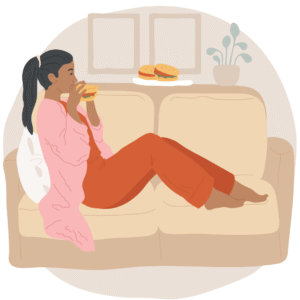What is binge eating and how it develops
Binge eating is defined as eating with a sense of loss of control and can be observed in different forms: objective binge eating and subjective binge eating. Objective binge eating is when one consumes a large amount of food in a short period of time and feels a sense of loss of control. Subjective binge eating is when one perceives themselves as eating a large amount of food with a sense of loss of control, but is possibly a regular or acceptable amount.
A cycle is often observed in binge eating:

- Believing weight or shape defines self-worth instead of looking at other aspects of life to define self-worth. This can lead to episodes of restricting and dieting.
Restriction or dieting
- As a result of preoccupation with weight or shape, one starts applying food rules and restrictions i.e. “I can’t eat sweets”. Food rules tend to be rigid and unrealistic, and lead to one “breaking” their rules and feeling shame or guilt.
Binge eating
- Once food rules are broken, one believes that that they might as well continue to eat because they’re already broken, often eating more than they wanted to and feel a strong sense of loss of control and uncomfortable fullness This binge eating episode is often followed by a strong sense of guilt, shame, and thoughts about how this binging would impact weight or shape. These uncomfortable emotions lead the person to a renewed preoccupation with their weight and shape, and a commitment to restrict again.
Things you can put in place to diminish binges
Overcoming binge eating is possible. It is advised to identify what triggers binges so one can be conscious of why they happen. We would like to note that emotional eating is normal, but that it is important to identify other ways to cope with emotions. If you’re struggling with binges, here are things you can put in place to diminish your binges:

Understanding vulnerabilities/triggers
Try to monitor your feelings and what’s going on before, during, and after a binge. Once you are aware of what makes you vulnerable to binge eating, aim to be more mindful of this so that you can restructure your surroundings or eliminate/avoid the triggers moving forward. These triggers can vary from a specific situation, or an emotion (i.e. sad, lonely, stressed, …), behavior, body sensation, etc …
Regulate your eating schedule
Avoid skipping meals and following diets. It can be helpful to eat 3 meals and 2-3 snacks a day with a maximum of 3-4 hours in-between to avoid binging. This can impact the frequency of binge eating, which are often triggered by feelings of anxiety, and following restrictive diets. Regulating your eating schedule will help you be more mindful of your eating, helping you regain control and relearning to follow and understand your body’s hunger and satiety signals.
Avoid restrictions
It’s important to have a balance of all types of foods including play foods. For some people, it’s tempting to want to avoid the foods they binge on, but it’s important to incorporate them gradually and at appropriate times and avoid placing them in categories such as « healthy food » and « junk food ». This can be further discussed and planned with your nutritionist/psychotherapist. In the meantime, make sure to watch our YouTube video talking about how people categorize foods into good and bad.

Incorporate coping strategies
This will help manage difficult situations/emotions without necessarily turning to foods. It could be helpful to practice mindfulness and self care i.e. journaling, having a spa day, going for a walk, listening to music, etc. or practice hobbies like exercising, playing music, drawing, etc.
Align your actions with your values
Identify your values and see if there is a discrepancy between what you value and what your actions look like.See how you could practice daily activities that demonstrate actions that you value. Try the Bull’s Eye Exercise, designed by an ACT therapist to help you identify and clarify your values in four domains of life: work/education, leisure, relationships, and personal growth/health. Click here to access the worksheet and do this exercise.
Conclusion
Binge eating is often a result of restriction, so working on your relationship with food and your body to make peace with them is crucial in binge-eating work. If following these tips is too triggering and/or hard for you, be sure to reach out to a health professional specialized in binge eating by contacting our team to schedule an appointment. Call (514) 437-4260 or email us at info@sooma.ca.
If you are struggling and need help, click here to book an appointment directly with one of our team members!
Written by
Mia El-Eid
Digital Marketing Coordinator
References
- Blog: https://breakbingeeating.com/stop-binge-eating/
- Instagram: see account: Binge eating nutritionist
- Podcast: Christy Harrison: episode 149, 231


































































